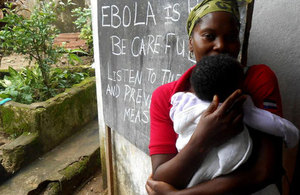UK treatment centre to tackle Ebola in Sierra Leone
British military and humanitarian experts to set up Ebola treatment centre in Sierra Leone.

In rural Freetown, Sierra Leone, Save the Children, with support from the UK government, is leading a community sensitisation programme where community leaders are trained on how to spread the word about preventing Ebola. Picture: Save the Children
British military and humanitarian experts will set up a medical treatment centre for victims of the Ebola outbreak in Sierra Leone, International Development Secretary Justine Greening announced today.
The 62 bed facility will be purpose built and operated by military engineers and medical staff. The initial phase of the facility will be constructed and operational within 8 weeks.
The UK’s support follows a direct request from the World Health Organisation and the government of Sierra Leone for assistance in containing the outbreak.
British military personnel will begin to survey and assess the site later this week. Based near the capital Freetown, the facility will treat victims of the disease, including local and international health workers and medical volunteers.
The UK government is working with Save the Children to design a long term plan to manage and operate the facility after it has been fully set up.
Announcing the deployment, International Development Secretary Justine Greening said:
Britain is at the forefront of the global effort to tackle this deadly outbreak, having already committed £25 million of support, including frontline treatment and funding for medical research to develop a vaccine.
The scale of the problem requires the entire international community to do more to assist the affected countries which is why the UK is working with the government of Sierra Leone to build a new medical treatment facility near their capital Freetown.
When it is up and running it will enable the UK to provide medical care for local and international health workers, as well as treatment for the wider population.
Minister for Armed Forces Mark Francois said:
The people of West Africa need our help and we will not stand idly by. The UK has been at the forefront of responding to the epidemic and our military will continue the great work so far. This operation will involve a unique set of challenges but I believe that we have the ability to provide support to the World Health Organisation, in helping to bring the outbreak under control.
Justin Forsyth, Save the Children Chief Executive said:
Ebola threatens thousands of people’s lives across West Africa and could set back development many decades. The key to combatting this epidemic is backing front line health workers and underpinning a fractured health system in Sierra Leone - without urgent action to assist medics, many more children and their families will suffer and die from this most appalling and tragic disease.
Save the Children is working alongside DFID and the MoD on a feasibility study to cement plans to firstly help set up the centre and then take it over with international experts, as well as local staff, to provide the very best life-saving health service under the most challenging conditions.
When complete, the facility will comprise:
-
a 50 bed medical unit for treating victims of the disease. Staffed by international health workers and Sierra Leonean medical staff, it will provide treatment to victims of the disease.
-
a specialist 12 bed treatment centre for health workers, including any local or international medical volunteers. It will provide high quality specialist care to ensure essential health workers can continue to respond to the disease as safely and efficiently as possible.
The health facility is in addition to the UK’s £25 million package of support to contain and control the disease. This includes multilateral support as well as direct funding to aid agencies operating on the ground.
Notes to Editors:
-
The UK is playing a leading role and working with the international community to combat Ebola. In addition to the new treatment centre, the UK has committed £5 million to partners like the WHO, Red Cross and Médecins Sans Frontières.This funding is helping to: * Provide better health information including public health announcements for remote rural communities so they know how to avoid contracting the disease; * Expand the investigation, monitoring and tracing of new Ebola cases; * Fill critical gaps in front-line personnel by providing funding for clinicians and other experts; * Deliver counselling and support for children orphaned by Ebola; * Provide medical supplies and care for victims and relief packages including clean clothing for families affected; and * Ensure safe burial of victims.
-
A further £20.5 million of UK support is helping contain Ebola through our longstanding commitments to multilateral institutions and the EU. Approximately, this includes: * £4.4 million of the £36.2 million of funding made by the African Development Bank (AfDB) – the UK is currently the largest donor to the AfDB; * £1.3 million of the EU’s £9.5 million contribution; and * £14.8 million of the World Bank’s £120.6 million response.
-
The Department for International Development and the Wellcome Trust have also launched a global call for research which could produce evidence to better manage the current outbreak and those in the future.
-
The UK, alongside Wellcome Trust and Medical Research Council, has also co-funded clinical trials in the UK of a potential vaccine which could be pivotal to preventing outbreaks. The grant will also enable GSK to manufacture additional doses of the vaccine at the same time as the initial clinical trials. If the trials are successful, stocks could be made available immediately by GSK to the WHO to create an emergency immunisation programme for high risk communities.
General media queries (24 hours)
Email mediateam@dfid.gov.uk
Telephone 020 7023 0600
If you have an urgent media query, please email the DFID Media Team on mediateam@dfid.gov.uk in the first instance and we will respond as soon as possible.
Updates to this page
-
Added translation
-
First published.